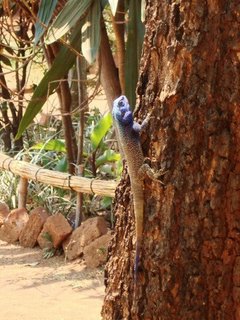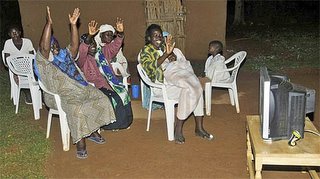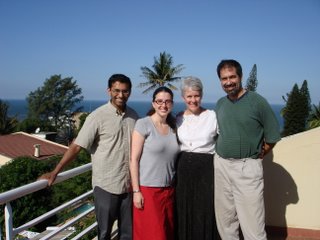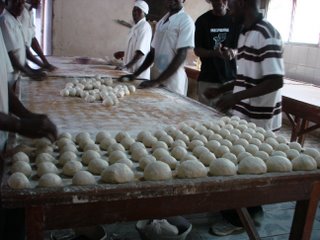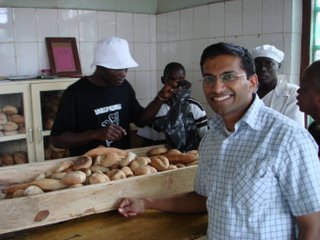Talk about doing business and yes that is why we came to Mozambique, to help people start businesses that could economically sustain themselves and develop the country and region. So, let me tell you a story about a simple label that we wanted to use to sell the “great and innovative produce” from local resources, namely virgin coconut oil. My favorite subject, so don’t get me started on that one.
Well, we invested some significant money and bought two simple oil producing systems and built a building and started to produce oil (June of 07). We even enlisted the help of our artistic daughter and her graphic arts oriented boyfriend (now husband) and produced a great looking label. Then we started looking for a printer. The printers in Mozambique wanted 50 cents a label, (no, not the singer) and we said no way, that is ridiculous. We went to Nelspruit, (2.5 hours away if you can get through the border in a decent time) and found a local printer would print them for about 10 cents each and the promise of one could do it for even less. So we placed an order and went back a week later to pick up our order of about $100’s worth of labels (July 07).
Ready to sell great coconut oil, we approached our first customer in local store and they asked us if we had a letter that approved our label from the National Health department? To cut a very long and laborious story short we got that approval after about 15 trips to the health department and $600 in testing costs, in January of 08. That is right, 5 months later. Fortunately our product doesn’t spoil easily.
We had pre-identified a company to print our labels in South Africa, so the rest should go quickly right? Well, when you are paying $300 just to set up the plates for about 4 color printing, every detail has to be right and so, 4 weeks later they are ready to print. Now we have received the final invoice and I ask someone to transfer the money to the SA company. A week goes by and no money is transferred, so I offer to open an eventually needed bank account to expedite the process only to be told I needed one more document and a couple of weeks. Hence, the easiest solution was to get in the car and cross the border with cash to make a direct deposit. No problem, just another half day.
On that trip, I attempt to get recover some value added tax from previously purchased materials as allowed by South Africa. We did not do it before as the line was long and we were told we had 3 months to recover the funds. Well, I needed two papers, one a letter authorizing me to receive the VAT for the company. No problem, we could do that the next time we came through. We write a letter and get it authorized and stamped. When I submit the letter, the woman behind the glass tells me, this letter is not up to standard and needs to read exactly like she writes on a piece of paper for me. She makes a copy or two and sends me away to come back with the letter as she wants it. It also needs a recent date, as something two months old is too old and I could be stealing from a former employer. (But, I am the employer) Oh, I can even authorize myself, I don’t need anyone else’s signature.
Back to the labels. These are shipped to Nelspruit and I now get to make the trip and pick them up. I have learned some things from previous trips, so I go the VAT line on my way into SA and it is short with no waiting. However, one paper is missing a vital number and I will need to get it re-issued to submit it. I stop by the SA clearing agent office and give her my original invoice (printed off my computer and signed by me) to submit to the 3-4 hour clearing process and am on my way to Nelspruit. After looking for 1 hour, eventually going door to door as no building have numbers posted, I eventually find the place where my labels have been shipped and pick them up. It also seems there are east/west/north/south splits on building numbers, but no address ever reflects this information. This means there are 2 buildings with the same number, but no designation as to which end of the street they are on.
Now I go back to the border and thankfully the clearing agent process goes smoothly. I pick up my papers, pay the $10 and am out of there. The VAT line is now long as in 2 hours and 20 minutes of standing until I get to the window. In the meantime there is pushing and shoving, people shouting, and general chaos as the Mozambicans have their own system for keeping order and punishing those who don’t obey the “rules.” Overall it felt a lot like being in a cattle chute with 60 teenagers who could not stop talking or yelling at each other.
When I get to the window, I can’t hear the attendant who essentially tells me the letter is not right and I won’t get my money back is she submits it like this. She gives me a document that tells me what it should say and informs me that I really need three letters, one that allows me to submit the paperwork, one to collect the check and another to cash it. I am incredulous. I still have a month to collect my $300 in taxes. I can only wonder how real business people do it. Aha, the document says I can submit by mail. Since the rest of this has gone so poorly, I seriously doubt I can trust the system.
On the Mozambique side of the border. Ushered into a small office, I wait 45 minutes to get a document typed up. I have to pay $35 for the privilege as I am representing a business whereas if I were only an individual, I would only pay $16. Why, because businesses can charge the big bucks and recover their costs. (this hurts as everyone is already telling me the product is too expensive) After jumping through three more hoops at three more stations and paying the import duty and VAT for Mozambique ($160), I am on my way, half sick with a headache and needing to drive at night, not recommended in Mozambique due to high accident rate after dark.
In pondering the situation I realize that in the US, it would be the equivalent of having my labels printed in Iowa, shipped to Chicago, driving 2.5 hours to get them because they can’t cross the border due to tax reasons and at what cost? I have not calculated it yet, but all of this needs to be recovered as cost of goods sold in one of the poorest countries on earth. And, things at the border are better than they used to be as the borders are now considered open for business! It is no wonder the economy and industry are in such bad shape. Consider this NORMAL.
If I were not called to the task, I would have given up like most do long ago. I have been sorely tempted to go through the back door and get around the hassles of red tape. God help us.

